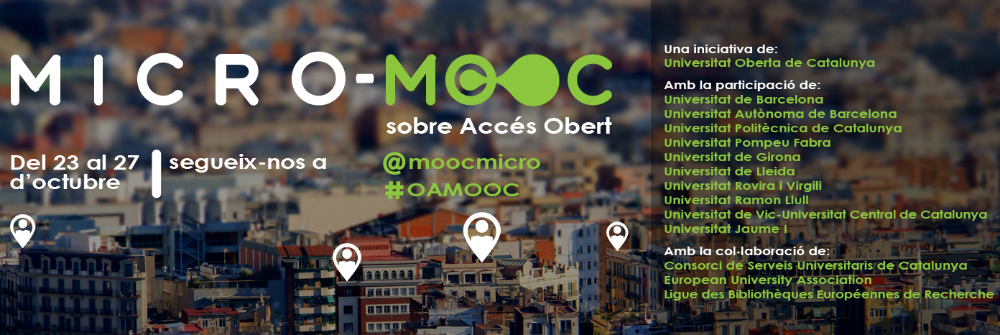Looking at good practices, initiatives, standards and tools
The aim of this course is to share the basic ideas and concepts relating to open access, explaining things in easy-to-understand language and providing an overview of good practices, initiatives, standards and tools for publishing, disseminating and archiving the data and publications generated in research work. This is an open initiative that should be particularly useful for researchers, students doing doctoral and master's degrees, and anyone else with an interest in this area. This course is to be run in micro-MOOC format, on Twitter. It will run for five days, from 23 to 27 October, and teaching will begin at 12 noon every day, via @moocmicro under the hashtag #OAMOOC.
The contents of this micro-MOOC will arrive on a daily basis over a half-hour period, by way of some twenty or so tweets. The focus will be on a different topic each day, and resources such as articles, images and videos will be shared. As this will all be happening on Twitter, anyone wanting to take part should follow the account @moocmicro. Specifying this account and including the hashtag #OAMOOC will enable participants to contribute with comments. Once the course is over, its contents will be published on Storify; a link to this will be shared via the same Twitter account.
This is a micro-MOOC that has been coordinated by the Universitat Oberta de Catalunya (UOC) in the framework of International Open Access Week and the UOC R&I Meeting Days series. Support on the creation of content came from University of Barcelona, Universitat Autònoma de Barcelona, Universitat Politècnica de Catalunya, Pompeu Fabra University, University of Girona, University of Lleida, Universitat Rovira i Virgili, Ramon Llull University, University of Vic - Central University of Catalonia, and Universitat Jaume I. Other collaborators include the Catalan University Service Consortium (CSUC), the European University Association (EUA), the Association of European Research Libraries (LIBER) and SPARC Europe.

